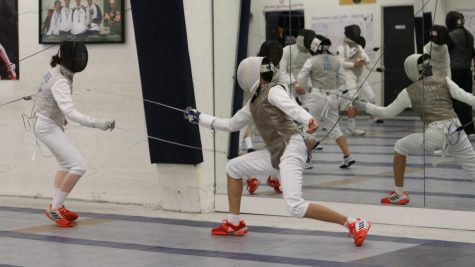Apex: Sophomore fencer plays chess with knives
This installment of Apex features sophomore fencer Ethan Choi’s journey to being crowned national champion.
September 20, 2018

On a raised stage in St. Louis, surrounded by referees, cameras and supporters, two fencers, clad in silver and white armor, stand perfectly still, blades raised, in anticipation for the final point of the national championship title. In the Facebook video, the referee shouts, and the two fencers begin dancing back and forth, the clinking of clashing metal blades and squeaking of shoes filling the air.
This July bout, the final of eight elimination rounds, determines the champion at the USA Fencing Summer Nationals, the largest national fencing competition and often the culmination of a year’s hard work for high school fencers across the nation.
Suddenly, the two fencers draw close together. The one on the right attacks, and in a deft movement, almost too quick to notice, his opponent parries and counterattacks, making contact with his weapon.
All at once, a strip on the floor lights up green to indicate a scored point, a roar erupts from the crowd, and Ethan Choi (10) takes off his mask and raises his arms in victory as the 2018 Division III Men’s Foil national champion.
And yet, had it not been for George Lucas’ Star Wars, none of this would have happened.

Ethan (right) attempts to score a touch during practice at M-Team. “I’ve heard this before, but [fencing] is like chess with knives,” Ethan said. “It’s great because it combines both your mind and your body.”
Ethan’s fencing journey began six years ago, when, prompted by a desire to mirror Star Wars’ lightsaber duels, he and his friends signed up for an introductory fencing lesson on Ethan’s birthday. His friends did not develop an interest in the sport, but Ethan stuck with it and began taking lessons at a local club.
Fencing comprises three separate sports with varying rules — foil, epeé and sabre — named for their different weapons. Ethan practices foil, a sport which includes complex rules, such as right-of-way, which necessitate significant mental strategy along with physical agility.
A fencing bout in foil occurs in three rounds of three minutes each, with victory being awarded to the first person to reach 15 points. Points in foil are scored through touches, which are recorded by an electrical scoring system and involve legal contact between a fencer’s foil and the torso of their opponent.
“I’ve heard this before, but it’s like chess with knives,” Ethan said. “It’s great because it combines both your mind and your body. So it’s not only about physical strength, but it’s about control.”
Although he learned quickly, Ethan was stuck in a state of what he described as “mediocrity,” always simply an average fencer. At his old club, where he fenced for three years, he lacked sufficient competition to emulate and rise to.
So, hungry to improve, Ethan moved to his current club, M-Team, a prestigious club in San Francisco led by the former Olympian and current head coach for the U.S. Men’s Foil team, Greg Massialas. Due to the long drive, he sacrificed — and continues to sacrifice — almost five hours of his day for each practice.
Ethan saw distinct growth in his game after joining the new San Francisco club, improving his footwork and mimicking those better than him. Despite this, he soon began noticing a pattern of inconsistency, with his standout performances marred by several lacking results. Sports-induced anxiety hindered him from consistently placing well in competition, which he struggled with right up to the National tournament.
“The competition before nationals was a pretty big one in Seattle, and I did absolutely horrible. I did worse this time around than I did last year at the same competition,” Ethan said. “I know it wasn’t true that I didn’t improve but it was like, ‘What happened?’”
Ethan knew he was capable of fencing much better, backed up by streaks of brilliance like his top-32 performance at the 2017 Summer Nationals as a rising high schooler competing in Cadet Men’s Foil against college freshmen.
He also knew he had to regain that control over his mind and overcome his anxiety in order to draw out the side of him worthy of a national champion title.
“I feel like the first event for me was like a warm-up, a wake-up call. The second one was just practicing, going back to the basics,” Ethan said. “By the end of that event, I was starting to experiment more. And by the time I got into Division III, I had left all the pressure and the stress behind because I felt like I was in my game, I was in my element.”
At Summer Nationals, Ethan went undefeated in six bouts in the pool, or group, stage. He then won seven more direct elimination bouts all by at least 5 points, including a 15-6 upset against the first seed, to be crowned national champion in a definitive 15-8 victory against New Jersey fencer Logan Rechler.
“If your anxiety is getting to you, the pressure is getting to you, it affects how you move, it affects your strategy and all that,” Ethan said. “I think at this nationals especially, that final third competition, I just let go of the pressure and I was really on top of the game I’ve been learning and honing for the past three years at M-Team, and I think that’s what really pushed me to get gold.”
With his first national title under his belt, Ethan and his coaches believe that he has reached a significant turning point in terms of conquering his anxiety as well as in his broader fencing career, which Ethan plans on continuing internationally.
“He’s very solid, very strong, but sometimes he gets a little too nervous in competition and sometimes he doesn’t really believe in himself and I think this last win helped change that,” Greg Massialas, Ethan’s coach, said. “I never put limits on what fencers have and if he can now turn the corner like he [just] turned the corner, I think he can do all sorts of exciting things and we look forward to what he does.”
In addition to attending intensive, multi-week fencing camps over the summer, Ethan finds time to practice three to four times a week during the school year at M-Team, honing both the physical and mental aspects of his game.
“There’s always a balance,” Ethan said. “I do homework in the car, I’ve lost a ton of sleep, but it’s all worth it.”


















![“[Building nerf blasters] became this outlet of creativity for me that hasn't been matched by anything else. The process [of] making a build complete to your desire is such a painstakingly difficult process, but I've had to learn from [the skills needed from] soldering to proper painting. There's so many different options for everything, if you think about it, it exists. The best part is [that] if it doesn't exist, you can build it yourself," Ishaan Parate said.](https://harkeraquila.com/wp-content/uploads/2022/08/DSC_8149-900x604.jpg)




![“When I came into high school, I was ready to be a follower. But DECA was a game changer for me. It helped me overcome my fear of public speaking, and it's played such a major role in who I've become today. To be able to successfully lead a chapter of 150 students, an officer team and be one of the upperclassmen I once really admired is something I'm [really] proud of,” Anvitha Tummala ('21) said.](https://harkeraquila.com/wp-content/uploads/2021/07/Screen-Shot-2021-07-25-at-9.50.05-AM-900x594.png)







![“I think getting up in the morning and having a sense of purpose [is exciting]. I think without a certain amount of drive, life is kind of obsolete and mundane, and I think having that every single day is what makes each day unique and kind of makes life exciting,” Neymika Jain (12) said.](https://harkeraquila.com/wp-content/uploads/2017/06/Screen-Shot-2017-06-03-at-4.54.16-PM.png)








![“My slogan is ‘slow feet, don’t eat, and I’m hungry.’ You need to run fast to get where you are–you aren't going to get those championships if you aren't fast,” Angel Cervantes (12) said. “I want to do well in school on my tests and in track and win championships for my team. I live by that, [and] I can do that anywhere: in the classroom or on the field.”](https://harkeraquila.com/wp-content/uploads/2018/06/DSC5146-900x601.jpg)
![“[Volleyball has] taught me how to fall correctly, and another thing it taught is that you don’t have to be the best at something to be good at it. If you just hit the ball in a smart way, then it still scores points and you’re good at it. You could be a background player and still make a much bigger impact on the team than you would think,” Anya Gert (’20) said.](https://harkeraquila.com/wp-content/uploads/2020/06/AnnaGert_JinTuan_HoHPhotoEdited-600x900.jpeg)

![“I'm not nearly there yet, but [my confidence has] definitely been getting better since I was pretty shy and timid coming into Harker my freshman year. I know that there's a lot of people that are really confident in what they do, and I really admire them. Everyone's so driven and that has really pushed me to kind of try to find my own place in high school and be more confident,” Alyssa Huang (’20) said.](https://harkeraquila.com/wp-content/uploads/2020/06/AlyssaHuang_EmilyChen_HoHPhoto-900x749.jpeg)











